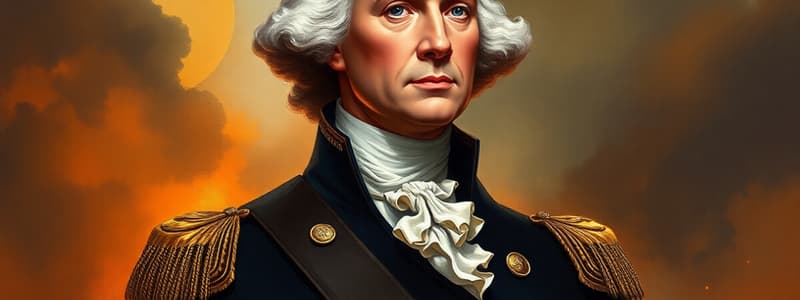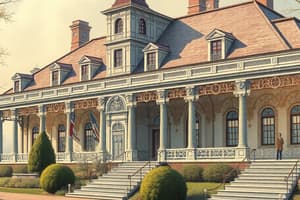Podcast
Questions and Answers
George Washington was tasked with leading the colonial ______.
George Washington was tasked with leading the colonial ______.
army
Washington's writings reveal a more ______ person.
Washington's writings reveal a more ______ person.
complex
Joseph Plumb Martin went for days without ______.
Joseph Plumb Martin went for days without ______.
food
In 1775, Congress believed Washington could tie the Southern Colonies more firmly to the ______.
In 1775, Congress believed Washington could tie the Southern Colonies more firmly to the ______.
George Washington wrote to Congress during the harsh winter at ______.
George Washington wrote to Congress during the harsh winter at ______.
Washington expressed that he would enjoy more real happiness at home with ______.
Washington expressed that he would enjoy more real happiness at home with ______.
Washington believed that homesick men made poor ______.
Washington believed that homesick men made poor ______.
Washington felt great distress from a consciousness that his abilities may not be equal to the extensive and ______ trust.
Washington felt great distress from a consciousness that his abilities may not be equal to the extensive and ______ trust.
Washington scorned the lack of ______ exhibited by his troops after the Battle of New York.
Washington scorned the lack of ______ exhibited by his troops after the Battle of New York.
Washington was most concerned with his soldiers' low ______.
Washington was most concerned with his soldiers' low ______.
Martin described stealing food as acting against the people's ______.
Martin described stealing food as acting against the people's ______.
A soldier ‘cannot ruin himself and family to serve his ______,’ Washington told Congress.
A soldier ‘cannot ruin himself and family to serve his ______,’ Washington told Congress.
Washington worried about his reputation and what people would think if the colonies lost the ______.
Washington worried about his reputation and what people would think if the colonies lost the ______.
When saying goodbye to his officers, Washington was described as being ______ in tears.
When saying goodbye to his officers, Washington was described as being ______ in tears.
Young soldiers looked forward to going to ______.
Young soldiers looked forward to going to ______.
Flashcards
George Washington's leadership
George Washington's leadership
George Washington accepted command of the Continental Army despite personal doubts about his abilities, highlighting his commitment to the colonists' cause.
Washington's military experience
Washington's military experience
Washington's previous experience in the French and Indian War made him a logical choice to lead the Continental Army
Washington's concern for soldiers
Washington's concern for soldiers
Washington recognized the hardships faced by his troops, particularly the issue of low pay, highlighting his compassionate view of their struggles.
Washington's doubts
Washington's doubts
Signup and view all the flashcards
Continental Congress
Continental Congress
Signup and view all the flashcards
Military trust
Military trust
Signup and view all the flashcards
Family vs. Country
Family vs. Country
Signup and view all the flashcards
Washington's low pay concern
Washington's low pay concern
Signup and view all the flashcards
Washington's Soldier Concerns
Washington's Soldier Concerns
Signup and view all the flashcards
Valley Forge Conditions
Valley Forge Conditions
Signup and view all the flashcards
Washington's Letter to Congress
Washington's Letter to Congress
Signup and view all the flashcards
Soldier Desertion Concerns
Soldier Desertion Concerns
Signup and view all the flashcards
General Washington's Rules for Stealing
General Washington's Rules for Stealing
Signup and view all the flashcards
Washington's Balance of Compassion and Duty
Washington's Balance of Compassion and Duty
Signup and view all the flashcards
Washington's Concern for Reputation
Washington's Concern for Reputation
Signup and view all the flashcards
Study Notes
George Washington: A Complex Figure
- Washington was a complex figure, displaying both strength and compassion. Stories portray him as larger-than-life, but his writings reveal his anxieties and concerns.
- He balanced his love for his family with his commitment to the war effort.
- Washington's military skills were evident in the French and Indian War; Congress saw him as crucial to uniting the Southern Colonies in the fight for independence.
Washington's Hesitations and Decision
- Despite his military background, Washington initially doubted his ability to lead the colonial army. He valued family life and worried about the challenges ahead.
- He expressed these concerns in letters to his wife, highlighting the difficulty of leaving home and family for an uncertain future.
- Washington accepted the role of commander-in-chief, expressing his concern about potentially failing but commitment to serving the cause.
Washington's Compassion for Soldiers
- Washington deeply cared about the soldiers' hardships, particularly their low pay which affected recruitment and morale.
- He witnessed the soldiers' suffering, vividly portrayed in soldier's accounts, including the lack of food and inadequate clothing during harsh winters.
- Washington criticized Congress for its lack of attention to soldier's needs, emphasizing a stark disparity between political concerns and the realities on the ground, drawing on comparisons between comfortable deliberations and harsh, demanding conditions faced by soldiers.
Washington's Leadership and Concerns
- Washington's compassion was intertwined with his leadership responsibilities. He acknowledged the soldiers' homesickness; however, he also recognized that it could lead to desertion, jeopardizing the war effort.
- He insisted on discipline and punished soldiers who neglected their duties by demonstrating the need for discipline to achieve the overall mission.
- He opposed stealing to protect both property rights and the soldiers’ well-being, and worried that the potential loss could hurt their reputation.
Washington's Personal Struggles & Military Success
- Washington's commitment was significant, deeply impacting his well-being, including moments of personal struggle and division.
- Despite the hardships, Washington acknowledged his army's resilience in the face of adversity.
- He highlighted the remarkable strength and endurance of the Continental Army, even in the face of significant challenges.
Washington's Farewell and Legacy
- Washington displayed both courage and kindness in his farewell to the officers.
- His genuine feelings for his men were evident, adding emotional depth to his leadership and a balanced warrior and caring spirit.
- He actively worked for the well-being of his men even after the war ended for fair pay.
Studying That Suits You
Use AI to generate personalized quizzes and flashcards to suit your learning preferences.





